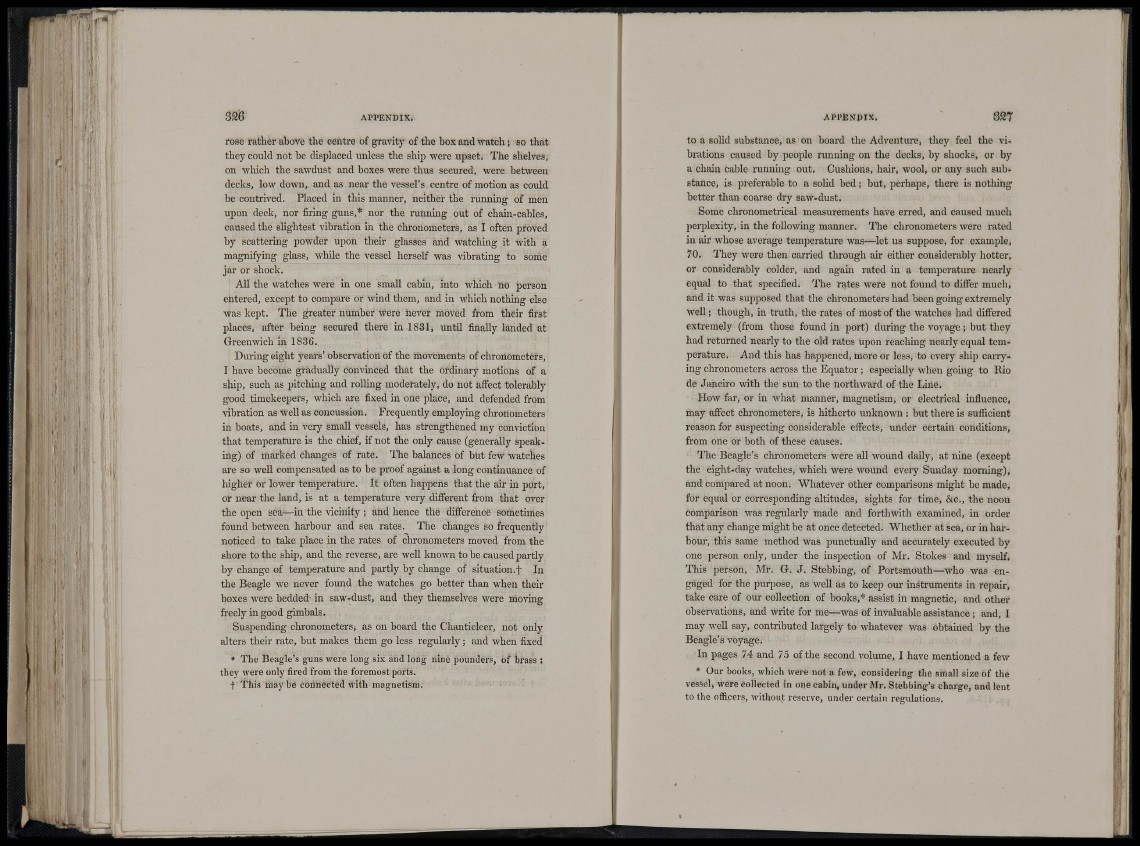
v i i ' ' j ;
(' ill ~ -, *
if J
i: ll
Hi ' i . ï ' l i ï I l l s iiill
326 APPEKDIX.
rose rather above the centre of gravity of the box and watch ; so that
they coiild not be displaced unless the ship were upset. The shelves,
on which the sawdust and boxes were thus secured, were between
decks, low down, and as neai- the vessel's centre of motion as could
be contrived. Placed in this manner, neither the running of men
upon deck, nor firing guns , * nor the running out of chain-cables,
caused the slightest ribration in the chronometers, as I often proved
by scattering powder upon their glasses and watching it with a
magnifying glass, while the vessel herself was vibrating to some
jar or shock.
All the watches were in one small cabin, into which no person
entered, except to compare or wind them, and in which nothing else
was kept. The greater number were never moved from their first
places, after being secured there in 1831, until finally landed at
Greenwich in 1836.
During eight years' observation of the movements of chronometers,
I have become gradually convinced that the ordinary motions of a
ship, such as pitching and rolling moderately, do not affect tolerably
good timekeepers, which are fixed in one place, and defended from
vibration as well as concussion. Frequently employing chronometers
in boats, and in very small vessels, has strengthened my conviction
that temperature is the chief, if not the only cause (generally speaking)
of marked changes of rate. ITie balances of but few watches
are so well compensated as to be proof against a long continuance of
higher or lower temperature. It often happens that the air in port,
or near the land, is at a temperature very diiFerent from that over
the open sea—in the vicinity ; and hence the difference sometimes
found between harbour and sea rates. The changes so frequently
noticed to talce place in the rates of chronometers moved from the
shore to the ship, and the reverse, are well known to be caused jjartly
by change of temperature and partly by change of s i tuat ion. ! In
the Beagle we never found the watches go better than when their
boxes were bedded^ in saw-dust, and they themselves were moving
freely in good ghnbals.
Suspending chronometers, as on board the Chanticleer, not only
alters their rate, but maloes them go less regularly ; and when fixed
• The Beagle's guns were long; six and long nine pounders, of brass :
they were only fired from the foremost ports.
t This maybe connected with magnetism.
APPENDIX. 3 2 7
to a solid substance, as on board the Adventure, they feel the vibrations
caused by people running on the decks, by shocks, or by
a chain cable running out. Cushions, hair, wool, or any such substailce,
is preferable to a sohd bed; but, perhaps, there is nothing
better than coarse dry saw-dust.
Some ohronometrical measurements have erred, and caused much
perplexity, in the following manner. The chronometers were rated
in air whose average temperature was—^let us suppose, for example,
70. They were then carried through air either considerably hotter,
or considerably colder, and again rated in a temperature nearly
equal to that specified. The rates were not found to differ much,
and it was supposed that the chronometers had been going extremely
well J though, in truth, the rates of most of the watches had differed
extremely (from those found in port) during the voyage; but they
had returned nearly to the old rates upon reaching nearly equal temperature.
And this has happened, more or less, to every ship carrying
chronometers across the Equa tor ; especially when going to Rio
de Janeiro with the sun to the northward of the Line.
How far, or in what manner, magnetism, or electrical influence,
may affect chronometers, is hitherto unknown: but there is sufficient
reason for suspecting considerable effects, under certain conditions,
from one or both of these causes.
ITie Beagle's chronometers were all wound daily, at nine (except
the eight-day watches, which were wound every Sunday morning),
and compared at noon. Wliatever other comparisons might be made,
for equal or corresponding altitudes, sights for time, &c., the noon
comparison was regularly made and forthwith examined, in order
that any change might be at once detected. Whether at sea, or in harbour,
this same method was punctually and accurately executed by
one person only, under the inspection of Mr . Stokes and myself.
This person, Mr . G. J . Stebbing, of Portsmouth—who was engaged
for the purpose, as well as to keep our instruments in repair,
take care of our collection of books , * assist in magnetic, and other
observations, and write for me—was of invaluable as s i s tance; and, I
may well say, contributed largely to whatever was obtained by the
Beagle's voyage.
In pages 74 and 75 of the second volume, I have mentioned a few
• Our books, which were not a few, considering tlie small size of the
vessel, were collected in one cabin, under Mr. Stebbing's charge, and lent
to the officers, without reserve, under certain regulations.